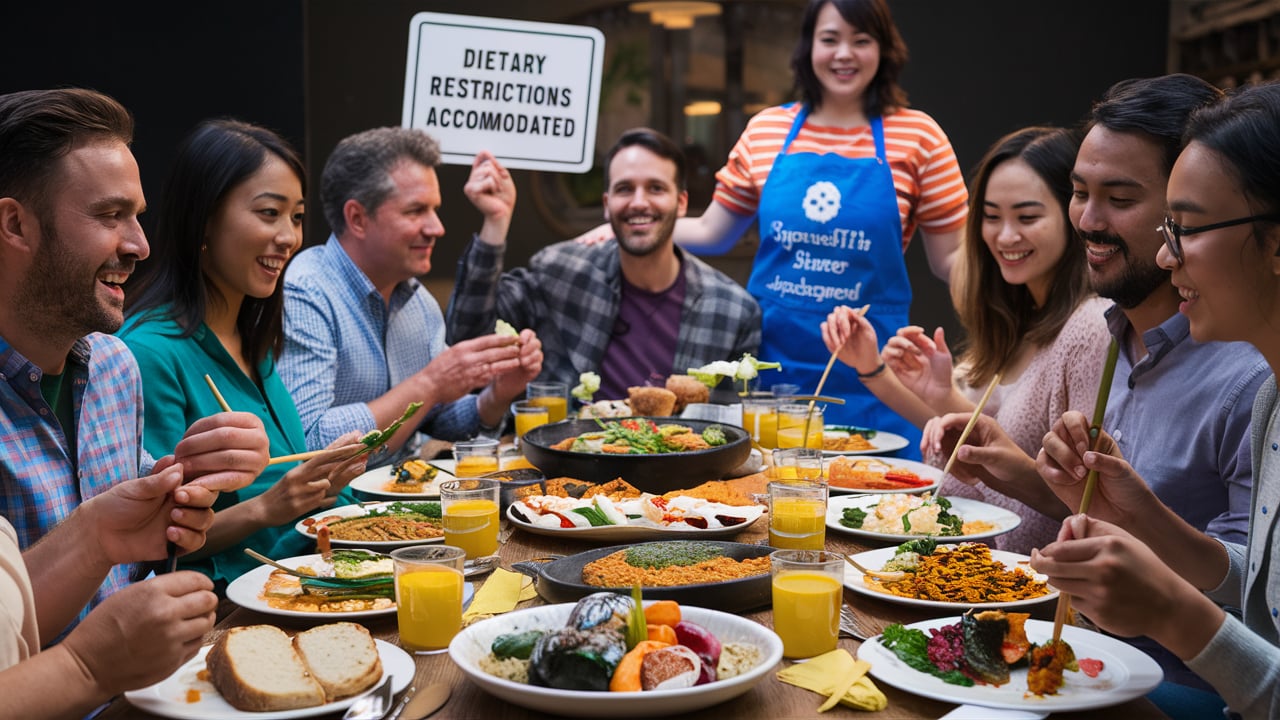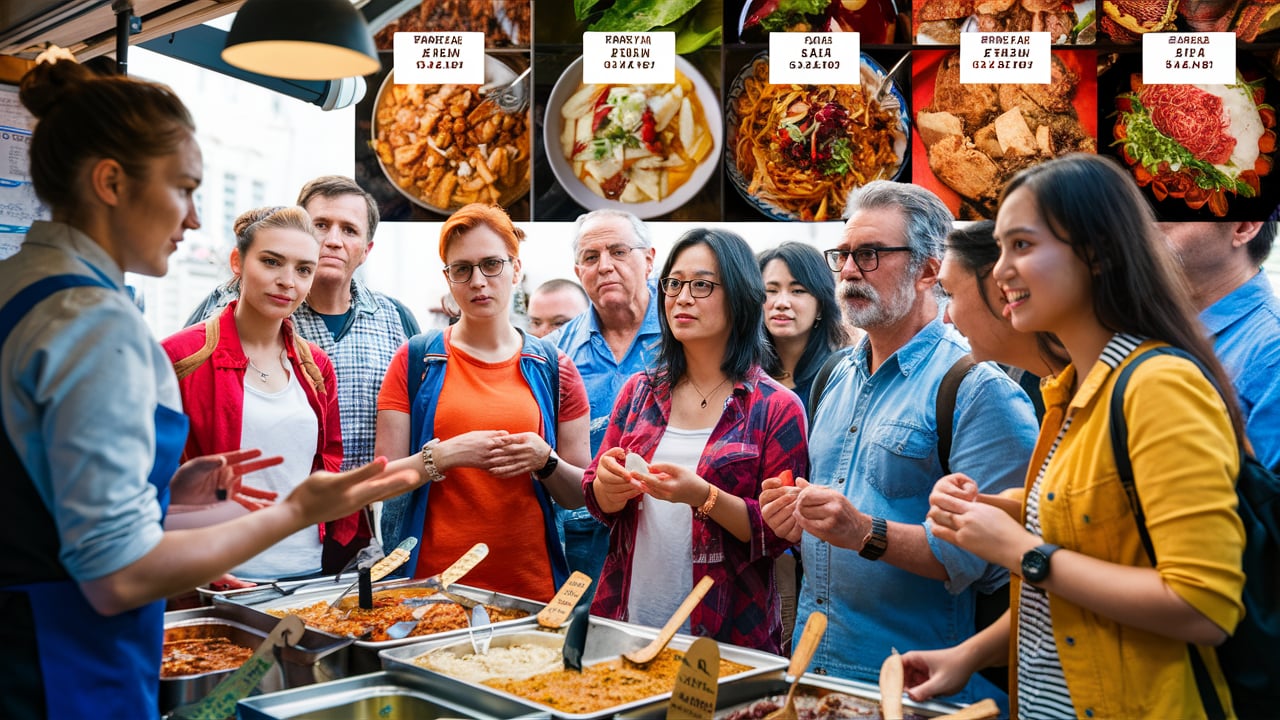Food tourism is a growing trend that involves travelers seeking out culinary experiences to learn more about the culture and lifestyle of a destination. However, for those with dietary restrictions, finding food tours that can accommodate their needs can be a challenge. This is where the phrase “Dietary Restrictions Requests to be Accommodated on a Food Tour” comes into play.
In this context, it refers to the specific requests made by travelers with dietary restrictions to ensure that the food served on a food tour is safe and suitable for their needs. In this article, we will explore the topic of accommodating dietary restrictions on food tours and provide some insights into how food tour companies can meet the needs of these travelers.
Accommodating dietary restrictions on food tours can be a challenge for both travelers and food tour companies. However, with careful planning and communication, it is possible to ensure that everyone’s needs are met. Here are some tips and insights from various sources on how to accommodate dietary restrictions requests on a food tour:
- Notify the food tour company of your dietary restrictions when you book, or afterward in your online account or mobile app2.
- Take dietary needs seriously and follow through on requests3.
- Incorporate dietary needs into the overall menu design3.
- Understand guests’ needs, whether they are based on religious restrictions, food allergies, or intolerances5.
- Create a section that asks attendees if they have dietary restrictions, needs, or allergies when they first register for an event6.
- Provide a variety of options that cater to different dietary needs1.
- Ensure that the food served is safe and suitable for those with food allergies1.
- Facilitate as many guests’ dietary requirements as possible through on-property dining and room service4.
- Make sure that delegates feel confident they can safely consume menu options presented for their needs5.
- Be as accommodating as possible to ensure that attendees feel welcome and can enjoy their meal6.
Explaining the importance of dietary restrictions on food tours.
Dietary restrictions may seem like a burden, especially when it comes to exploring new foods on a food tour. However, understanding and accommodating these restrictions is crucial for creating an inclusive and enjoyable experience for all participants.
Firstly, dietary restrictions are not just a matter of personal preference, but often stem from medical conditions, allergies or ethical beliefs. By respecting and catering to these restrictions, food tour organizers can ensure the safety and well-being of their guests. Nobody wants to experience the discomfort or health risks associated with consuming something they cannot tolerate.
Secondly, catering to dietary restrictions also allows food tours to showcase the diversity of culinary options available. By offering alternatives or modified versions of dishes that cater to different needs, participants who may have initially felt left out are able to fully participate in the experience. This promotes inclusivity and fosters a sense of belonging among all attendees.

In conclusion, while accommodating dietary restrictions may require additional planning and effort on the part of food tour organizers, doing so is essential for creating an inclusive environment where everyone can enjoy the journey through local cuisine.
It highlights empathy towards those with different needs while showcasing the rich variety that exists within the culinary world. So next time you embark on a food tour, remember the importance of catering to dietary restrictions – it’s about more than just sustenance; it’s about ensuring an unforgettable experience for all!
Common dietary restrictions: Exploring different types of restrictions.
When it comes to dietary restrictions, there are a plethora of different types that people may follow for various reasons. One common dietary restriction is vegetarianism or veganism, where individuals abstain from consuming animal products. This can include meat, dairy, eggs, and even honey. Vegetarian and vegan options have become increasingly popular in restaurants and food tours due to the rising demand for plant-based alternatives.
Another commonly known dietary restriction is gluten-free. Gluten is a protein found in wheat, barley, and rye which can cause digestive issues for some individuals with celiac disease or gluten sensitivity. As awareness of gluten-related disorders has grown over the years, so too have the number of gluten-free options available on menus and food tours.
One lesser-known but growing dietary restriction is the FODMAP diet. FODMAP stands for fermentable oligosaccharides, disaccharides, monosaccharides, and polyols – these are type of carbohydrates that can be difficult to digest by some individuals with irritable bowel syndrome (IBS). The FODMAP diet involves avoiding certain high-FODMAP foods such as onions, garlic, wheat products, certain fruits and vegetables during times when IBS symptoms are active.
By understanding these common dietary restrictions and accommodating them on food tours or restaurant menus allows companies to cater to a wider range of customers while still providing delicious options that meet their needs.
Communicating your needs: Tips for making requests effectively.
Communication is key when it comes to making requests effectively, especially when it comes to dietary restrictions on a food tour. One important tip is to be clear and specific about your needs. Instead of simply saying I have dietary restrictions, specify what those restrictions are, whether it’s a food allergy or intolerance. This information will help the tour organizers plan and accommodate your needs in the best way possible.
Another helpful tip is to communicate your needs ahead of time. Rather than waiting until the last minute to mention your dietary restrictions, make sure to inform the tour organizers in advance. This allows them time to prepare and make any necessary arrangements for you. It also shows consideration on your part, which may lead to a more positive experience overall.

Additionally, be open-minded and flexible in your requests. While it’s important for tour organizers to accommodate your needs, keep in mind that certain limitations may exist depending on the location or availability of certain ingredients. Being understanding and willing to work with the organizers can go a long way in ensuring everyone has a great experience on the food tour.
Accommodation options: How food tours can cater to restrictions.
Food tours have become increasingly popular among travelers seeking an authentic culinary experience in a new city. But what happens when you have dietary restrictions? Thankfully, many food tours are now catering to a wide range of dietary needs, ensuring that everyone can enjoy the experience to the fullest. From gluten-free options to vegan-friendly tastings, these tours are embracing inclusivity and providing a deliciously diverse range of options.
One great example is the rise of plant-based food tours for those following a vegan or vegetarian diet. These specialized tours not only introduce participants to local vegan restaurants but also highlight hidden gems that offer meat-free alternatives. So whether you’re committed to a plant-based lifestyle or simply looking for delicious vegetable-focused dishes, these food tours have got you covered.
Another accommodation option gaining traction is gluten-free food tours. With more people being diagnosed with celiac disease or choosing to adopt a gluten-free diet for health reasons, it’s important for tour operators to provide suitable options. Gluten-free food tours take participants on an exciting journey through eateries specializing in safe and tasty gluten-free dishes, proving that dietary restrictions don’t mean missing out on delectable experiences.
In conclusion, if you have specific dietary restrictions, don’t let them hold you back from enjoying a food tour in your destination of choice. Many tour operators are now taking extra steps to accommodate various dietary needs and preferences, offering specialized options such as plant-based or gluten-free food tours.
Ensuring safety and cross-contamination prevention: Key considerations.
Key considerations for ensuring safety and preventing cross-contamination are of utmost importance when accommodating dietary restrictions on a food tour. Firstly, it is crucial to have clear communication channels with participants beforehand to gather information about their specific dietary needs or allergies. This will help the tour organizers and chefs tailor the food options accordingly, ensuring everyone’s safety.
In addition, establishing strong relationships with trusted local vendors and restaurants can greatly contribute to the success of accommodating dietary restrictions. By working closely with these establishments, tour organizers can ensure that they understand the requirements and take necessary precautions while preparing and serving food.

Moreover, implementing stringent sanitation practices becomes imperative in order to prevent cross-contamination. Tour organizers should have mechanisms in place to maintain separate cooking utensils, cutting boards, and preparation areas for different types of dietary options. This not only mitigates the risk of allergens contaminating food but also creates an inclusive environment where all participants can enjoy their meals stress-free.
By prioritizing safety through clear communication, building strong partnerships with vendors, and implementing strict sanitation practices, food tour operators can successfully accommodate diverse dietary restrictions while delivering a memorable culinary experience for everyone involved.
Case studies: Real-life examples of successful accommodations.
1. One inspiring case study of successfully accommodating dietary restrictions on a food tour is the story of Lisa, a vegan traveler who joined a culinary excursion in an unfamiliar city. Before embarking on the tour, Lisa informed the tour operators about her dietary requirements, unsure of how they would be accommodated.
To her delight, she discovered that each stop on the tour had carefully prepared vegan options tailored to her needs. From vibrant plant-based dishes to creative vegan twists on traditional recipes, Lisa was able to fully immerse herself in the local food scene without compromising her values or taste buds.
2. Another heartwarming example comes from John and Sarah, a couple with severe gluten allergies who were eager to explore new flavors while maintaining their strict gluten-free diets. They decided to participate in a food tour specifically designed for individuals with dietary restrictions.
Throughout the day, their knowledgeable guide took them to hand-picked restaurants and street vendors that offered a wide variety of safe and delicious gluten-free options. From freshly baked gluten-free bread to innovative gluten-free pasta dishes, John and Sarah felt like they were finally able to enjoy culinary adventures without any worries or limitations.
How can I inform a food tour company about my dietary restrictions?
When it comes to going on a food tour, informing the company about your dietary restrictions is crucial to ensure a enjoyable and safe experience. One of the best ways to do this is by contacting the food tour company ahead of time.
They will appreciate your proactive approach in providing them with information about your dietary needs, allowing them enough time to make necessary arrangements and accommodations. This will also help prevent any potential issues or disappointments during the tour.
In addition to contacting the company directly, you can also check if they have an option for dietary restrictions on their website or booking form. Many food tour companies are aware of the diverse range of dietary needs that their customers may have, and they may have a dedicated section where you can mention your specific requirements. Providing detailed information about your allergies, intolerances, or preferences in this section will give them a clear understanding of what they need to consider when planning out the food stops for the tour.

Lastly, it’s worth noting that communication is key in ensuring that your dietary restrictions are taken into account throughout the food tour. Don’t hesitate to double-check with the guide or staff members at each stop along the way if certain dishes contain any ingredients you should avoid. Asking questions politely and being open about your needs will not only help you stay safe but also educate others about different dietary restrictions and foster greater inclusivity within the food industry as a whole.
What are some common dietary restrictions that food tour companies accommodate?
Food tours are a fantastic way to explore the local cuisine of a destination, but what if you have dietary restrictions? Luckily, many food tour companies understand that not everyone can eat everything and are more than willing to accommodate various dietary needs. Some common dietary restrictions that these companies can often accommodate include gluten-free, vegetarian or vegan, and lactose intolerant diets.
For those who are gluten-free, food tour companies will often offer options such as gluten-free breads or pastries made from alternative grains like rice or buckwheat. They may also be able to provide alternatives for sauces or dressings that contain gluten. Vegetarian or vegan individuals can also find options on food tours as many destinations have a variety of plant-based dishes available.
From flavorful vegetable curries to hearty bean-based stews, there is no shortage of delicious options for those following these diets. Additionally, lactose intolerant individuals need not worry as many food tour companies can provide alternatives for dairy products with lactose-free options such as soy milk or coconut milk-based desserts.
Understanding that everyone has different dietary needs is pivotal in creating an inclusive experience on a food tour. By accommodating common dietary restrictions such as gluten-free, vegetarian/vegan diets, and lactose intolerance, food tour companies ensure that all participants can enjoy the culinary delights of the destination without compromising their health or personal beliefs.
Are there any food tours that specialize in accommodating vegan diets?
Veganism has seen a surge in popularity in recent years, with more people choosing to embrace this lifestyle for various reasons, including ethical concerns and health benefits. With this growing demand, it’s only natural that the food tourism industry would adapt to accommodate vegan diets. Luckily, there are plenty of food tours available that specialize in serving up delicious plant-based options.
One such tour is the Vegan Food Tour in Portland, Oregon. This city is known for its vibrant vegan scene, and the tour takes participants on a culinary adventure through some of the best plant-based eateries in town. From mouthwatering seitan sandwiches to decadent dairy-free desserts, this tour showcases the diverse range of vegan cuisine available.

If you’re looking for a more international experience, consider joining Veg Voyages’ Vegan Food Adventure in India. Led by local guides who are passionate about veganism and sustainable travel, this tour explores the colorful flavors of Indian cuisine without compromising on plant-based principles. You’ll have the opportunity to try traditional dishes like chana masala and dosas while learning about the cultural significance of each dish.
Can food tour companies accommodate gluten-free diets?
Food tours are a wonderful way to explore the local cuisine of a new city, but what about those with dietary restrictions? Many people choose to follow a gluten-free diet for various reasons, and it’s important for food tour companies to be able to accommodate these needs. Thankfully, many food tour companies are now making an effort to provide options for those following gluten-free diets.
One way that food tour companies can accommodate gluten-free diets is by offering alternative options for certain dishes. For example, instead of serving a dish with wheat-based pasta, they may offer a gluten-free pasta or substitute the pasta altogether with vegetables or rice. By being flexible and willing to make substitutions when necessary, food tour companies can ensure that everyone can enjoy the experience.
Another step that some food tour companies take is partnering with restaurants that already specialize in catering to dietary restrictions such as gluten-free diets. This way, participants on the food tours can still sample authentic dishes while staying within their dietary boundaries. It’s important for these partnerships to be transparent and well-communicated so that participants know which restaurants are capable of accommodating their needs.
Overall, it is definitely possible for food tour companies to accommodate gluten-free diets. With proper planning and communication with partner restaurants, everyone can enjoy the culinary delights of a new city without compromising their health or dietary choices.
How do food tour companies ensure that the food they serve is safe for those with food allergies?
Food tour companies take the safety and well-being of their customers with food allergies very seriously. They understand that even a small amount of allergen can have severe consequences for individuals with allergies, so they go to great lengths to ensure that the food they serve is safe. Firstly, they communicate clearly with their partner restaurants about any dietary restrictions or allergens. This ensures that the restaurants are aware of the specific needs of their guests and can make appropriate accommodations.
Secondly, food tour companies often work closely with chefs and restaurant staff to educate them on food allergies and cross-contamination prevention. By providing detailed information about common allergens, as well as best practices for handling and preparing allergy-friendly meals, these companies help ensure that every step in the food preparation process is carried out safely.

Lastly, food tour companies may offer alternative options for individuals with severe allergies. In some cases, this might mean substituting certain ingredients that are known allergens in dishes or offering a separate menu specifically designed for those with dietary restrictions. By going above and beyond to provide safe alternatives, these companies ensure that everyone can enjoy an unforgettable culinary experience without worrying about their health.
In conclusion, while accommodating various dietary restrictions can be challenging for food tour companies, they prioritize safety by actively communicating with partner restaurants about customers’ needs, educating chefs on allergen prevention techniques, and providing alternative options when necessary. These efforts highlight their commitment to ensuring a positive dining experience for all participants while maintaining a focus on safety and inclusivity.
Are there any food tours that cater specifically to kosher diets?
When it comes to exploring new cuisines and experiencing the local flavors, those with kosher diets often face a unique challenge. However, the good news is that there are indeed food tours that cater specifically to kosher diets. These tours ensure that individuals following kosher dietary laws can still enjoy the culinary delights of a destination without compromising their beliefs.
One such example is the Kosher Food Tour in Jerusalem, Israel. This tour takes visitors on a gastronomic adventure through the historic streets of Jerusalem while ensuring all meals adhere to strict kosher standards. From sampling traditional Jewish dishes to indulging in Middle Eastern flavors, participants can immerse themselves in the vibrant food scene while feeling confident about their dietary choices.
Similarly, New York City offers a variety of food tours tailored for kosher eaters. These tours not only provide an opportunity to discover hidden culinary gems but also educate participants about the rich history and cultural significance of Jewish cuisine in the city. Whether it’s exploring iconic Jewish delis or discovering diverse kosher restaurants across different neighborhoods, these food tours allow individuals with kosher diets to savor authentic flavors without compromise.
So whether you’re planning a trip to Israel or visiting bustling cities like New York City, rest assured that there are food tours available that cater specifically to kosher diets. These specialized experiences not only satisfy your taste buds but also provide valuable insight into Jewish culture and heritage through its delectable cuisine.
What should I do if my dietary restrictions change after I’ve booked a food tour?
If you find yourself in a situation where your dietary restrictions change after you’ve already booked a food tour, don’t panic! There are a few steps you can take to ensure that you still have a delightful culinary experience. First and foremost, reach out to the food tour company or organizer as soon as possible. They may be able to accommodate your new dietary needs or make alternative arrangements for you.
When contacting the food tour company, be sure to explain your specific dietary restrictions clearly and provide any relevant details. It’s important to remember that not all food tours will be able to cater to every dietary requirement, but many will do their best to work with you. Don’t hesitate to inquire about alternative options or substitutions; they may surprise you with delicious alternatives that fit within your updated constraints.

In addition, it can be helpful to do some research on the local cuisine beforehand. By familiarizing yourself with regional dishes and ingredients, you’ll have a better idea of what might be suitable for your new dietary restrictions. This way, even if the food tour isn’t able to completely tailor each stop to your needs, you can proactively choose dishes that align more closely with your current diet.
Remember: communication is key in any situation involving changes in dietary restrictions. The more proactive and transparent you are about communicating with the food tour company or organizer, the higher the likelihood of finding accommodations that meet both parties’ needs.
How do food tour companies handle requests for halal food?
In today’s diverse culinary landscape, catering to dietary restrictions has become an essential aspect for any food tour company. One common request that often arises is the need for halal food options. Food tour companies understand that providing delicious and authentic halal dishes is not just about inclusion but also about respecting religious and cultural beliefs.
To handle requests for halal food, these companies proactively collaborate with local restaurants and vendors that specialize in halal cuisine. They build a network of trusted establishments that can offer guests an immersive experience while adhering to their dietary requirements. This ensures that participants have access to a wide range of flavors and traditional dishes without compromising on their beliefs or values.
Furthermore, food tour companies train their guides extensively on the importance of accommodating dietary restrictions such as halal. Guides are equipped with knowledge about local ingredients, preparation methods, and hidden sources of non-halal ingredients in order to ensure complete transparency with participants. This enables them to confidently navigate through various dining options while keeping guests informed throughout the tour.
By going above and beyond to address the needs of individuals requesting halal food options, food tour companies create inclusive experiences where everyone can indulge in top-notch culinary delights without compromising their religious or cultural preferences.
Are there any food tours that offer options for those with low-carb diets?
If you’re following a low-carb diet, you may be wondering if there are any food tours that can accommodate your dietary restrictions. The good news is that many food tour companies understand the growing popularity of low-carb diets and are now offering options specifically tailored to those needs. These tours provide an opportunity to explore local cuisine while still adhering to your dietary preferences.
One option for low-carb food tours is to choose ones that focus on specific cuisines known for their lower carb options, such as Japanese or Mediterranean cuisine. These types of tours often feature dishes like sashimi, fresh seafood, and grilled meats or vegetables cooked with olive oil. By selecting a tour focused on these types of cuisines, you can ensure that there will be plenty of low-carb options available.
Another approach is to reach out directly to food tour companies and inquire about their ability to accommodate dietary restrictions. Many companies are happy to work with guests who have specific needs and may be able to provide modified versions of popular dishes or suggest alternative options that fit within a low-carb diet. It’s always worth asking, as you never know what accommodations might be available until you try!
How can I find a food tour company that can accommodate my specific dietary needs?
One of the most exciting parts of exploring a new city is trying out the local cuisine. However, if you have specific dietary needs, finding a food tour company that can accommodate them can be challenging. The good news is that with a little research and planning, it’s possible to find the perfect food tour for your culinary journey.
When searching for a food tour company to cater to your dietary restrictions, start by checking their website or contacting them directly to inquire about their ability to accommodate special diets. Many companies are aware of the growing demand for gluten-free, vegan, or vegetarian options and will gladly provide information on what they can offer.
Another useful tip is to read online reviews from previous customers who had similar dietary restrictions. These reviews often mention whether the company was able to meet their specific needs and provide insight into the quality and variety of food options available. Additionally, consider reaching out to local community groups or forums dedicated to individuals with dietary restrictions in your chosen destination. They may have recommendations for food tour companies known for their inclusive menus.
Conclusion.
In conclusion, accommodating dietary restrictions requests on a food tour is essential to ensure that all guests can enjoy the experience. From notifying the food tour company of your dietary needs to providing a variety of options that cater to different dietary needs, there are several ways to ensure that everyone’s needs are met. It is important for food tour companies and event planners to understand guests’ needs and take them seriously.
By incorporating dietary needs into the overall menu design and ensuring that the food served is safe and suitable for those with food allergies, food tour companies can create a welcoming environment for all guests. Ultimately, accommodating dietary restrictions requests on a food tour is a crucial aspect of ensuring that everyone can enjoy the culinary experiences that food tourism has to offer. Consider reading >>>>> Are Alcoholic Beverages Included in Food Tours? to learn more.
I am an accomplished author at Fact Finders Company LLC, a renowned publishing house based in New York City. With a passion for research and a talent for writing, I have contributed to numerous non-fiction titles that explore a wide range of topics, from politics and history to science and technology. My work has been widely praised for its accuracy, clarity, and engaging style. Nice Reading here at Fact After Fact.








